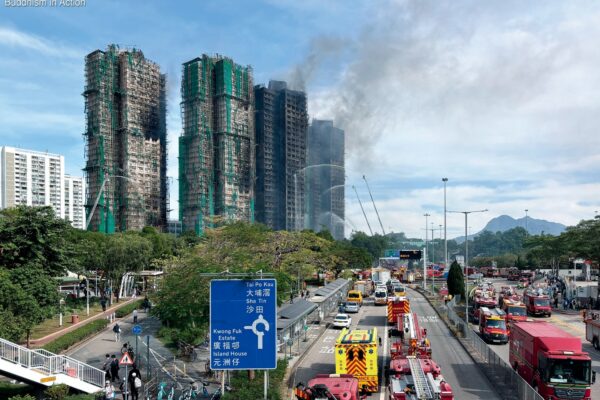By Zhang Li-yun
Compiled and translated by Wu Hsiao-ting
Photos by Huang Xiao-zhe
Street people in Taiwan scrape by with the help of social welfare organizations, but when they become ill, even minor health problems can develop into serious issues. Because their poverty makes them reluctant to seek medical attention, Tzu Chi has stepped in to help.
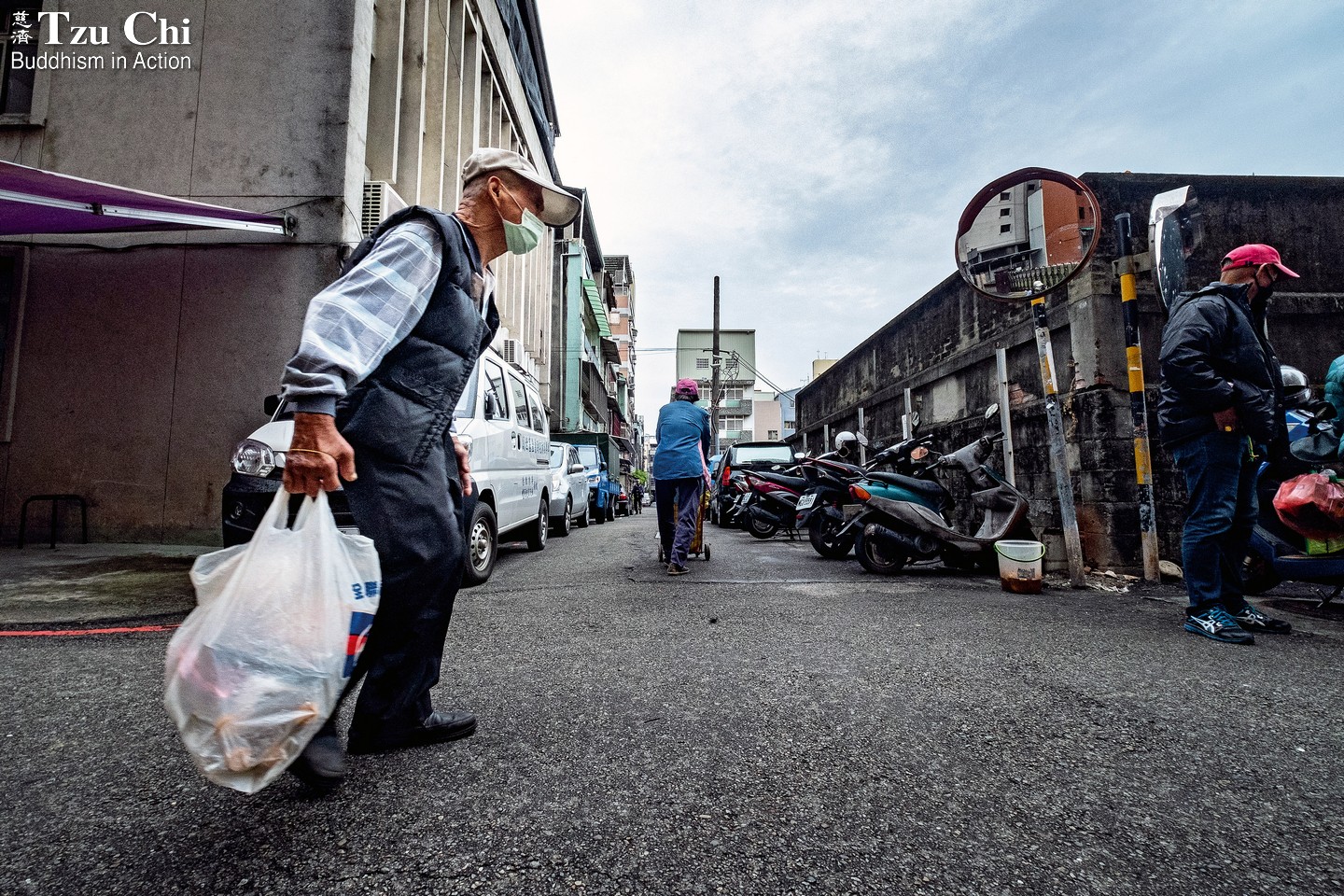
A homeless person, carrying all his belongings, roams the streets. There are nearly 3,000 listed homeless people in Taiwan, but the actual number is higher.
It was a Saturday afternoon. Though a fine drizzle was falling, the Zenan Homeless Social Welfare Foundation’s Taichung station, nestled in a small alley off Minquan Road in Taichung, central Taiwan, was abuzz with people and activity. A free clinic event offering treatment in internal medicine, surgery, and dentistry had begun in earnest. In addition to medical treatment at no cost, free haircuts were offered at the entrance of the station.
The Zenan Foundation is known for its homeless care, providing food, clothing, temporary shelter, job placement, and other services for this group of vulnerable people. The free clinic mentioned above is a monthly event, a joint effort with Tzu Chi. It has been going on for years.
Several volunteers in purple vests were busy at the event. They had been homeless themselves at one time. Wu (not his real name) was one of the volunteers. He had been criminally charged over ten years before, but was eligible for community service in exchange for jail time after receiving his sentence. The Zenan Foundation’s Taichung station was where he performed his community service. He knew that landing a job at his age and without marketable skills would be difficult after his mandatory service had been completed, so he decided to stay on at the foundation. “I did wrong before,” he said. “My volunteer work with the foundation has been a kind of redemption for me.” He continued, shifting his focus, “Thanks to Dr. Ji for making these free clinics possible. They are a real blessing to the homeless.”
As if summoned by Wu’s words, Dr. Ji Bang-jie (紀邦杰) arrived at the event. He had come straight from work at his own medical clinic. Grabbing a microphone, he greeted the street people on-site. “It has been cold lately. Do you have comforters with you? Sleeping bags? Where have you been sleeping at night?” he asked those present.
The monthly free clinic was launched in August 2010 after social workers from the Taichung City Association for the Homeless (TCAH) asked Dr. Ji, a member of the Tzu Chi International Medical Association (TIMA), to provide regular free medical events for the homeless. The doctor’s weekend schedules at the time were already packed with Tzu Chi free clinic events and other volunteer work for the foundation. The only time he had available was the third Saturday afternoon of every month, so he earmarked that time slot for the homeless. He also called upon other TIMA doctors and nurses to join him in serving the street people. Because the space TCAH could offer for the monthly event was too small, the Zenan Foundation’s venue on Minquan Road was chosen as the site for this regular activity.
Each free clinic event serves 40 to 50 people. Patients can see the doctors and receive medicine, all at no cost. The homeless often experience improvements in their health as long as they are willing to seek help at the clinic. Dr. Xiao Rui-he (蕭瑞和) has participated in the event many times. He said that though some street people continue to drink alcohol against their advice, at least they come to the clinic regularly, which shows that they still care about their health. “As doctors, we are happy to be able to help them,” he remarked.
The free clinic event each month is a lively, heart-warming affair, with singing, sounds of different musical instruments, and enthusiastic greetings filling the air. Tzu Chi volunteers who live near the venue prepare beverages for attendees, lead group activities, and help in whatever other ways they can. In addition to the homeless, the clinic draws underprivileged people living nearby as well. The TIMA doctors serve those people too, even though they may not actually be homeless.
A woman in her 80s complained about weakness in her legs as well as neck, shoulder, and back pains. Dr. Zeng Jing-xin (曾景新) taught her a few simple exercises to relieve her pain and strengthen her leg muscles. One exercise was raising her legs. Considering her age, the doctor was sure to remind her to hold on to a table or wall to steady herself when she lifted her legs. “Do this exercise every day so that your knees won’t be weak.” The gloomy look on her face when she arrived had been replaced with gratitude by the time she was done. She repeatedly thanked the health workers and support volunteers on-site: “Thank you, thank you! You people from Tzu Chi are really nice!”
Dr. Zeng stressed the importance of providing patients with emotional care in addition to medical treatment. Such love and care warms patients’ hearts, making them feel as if they are meeting family when they come to the clinic. It doesn’t matter that the medical professionals and support volunteers that staff the event may be different each time. All that matters is that the same love and care is there.
Dentistry is a must-have service at the event. Good oral hygiene is hard to maintain for street people because they don’t have fixed residences. When dental problems arise, they usually wait until they can’t stand the pain to seek treatment. They lose a lot of teeth this way. Dentist Lin Cong-qi (林淙祺) said, “When we first started our service at the free clinic, almost all the street people had serious plaque buildup. The teeth of some of them had become loose.” Dentists at the clinic cleaned their teeth, gave them treatment, and shared oral health tips with them. “We told them bad oral health will affect their health in general, and to at least rinse their mouths out or brush their teeth after meals,” said Dr. Lin. By and by, the oral health of the homeless people who regularly came to the clinic improved, much to the happiness of the dentists who serve them.
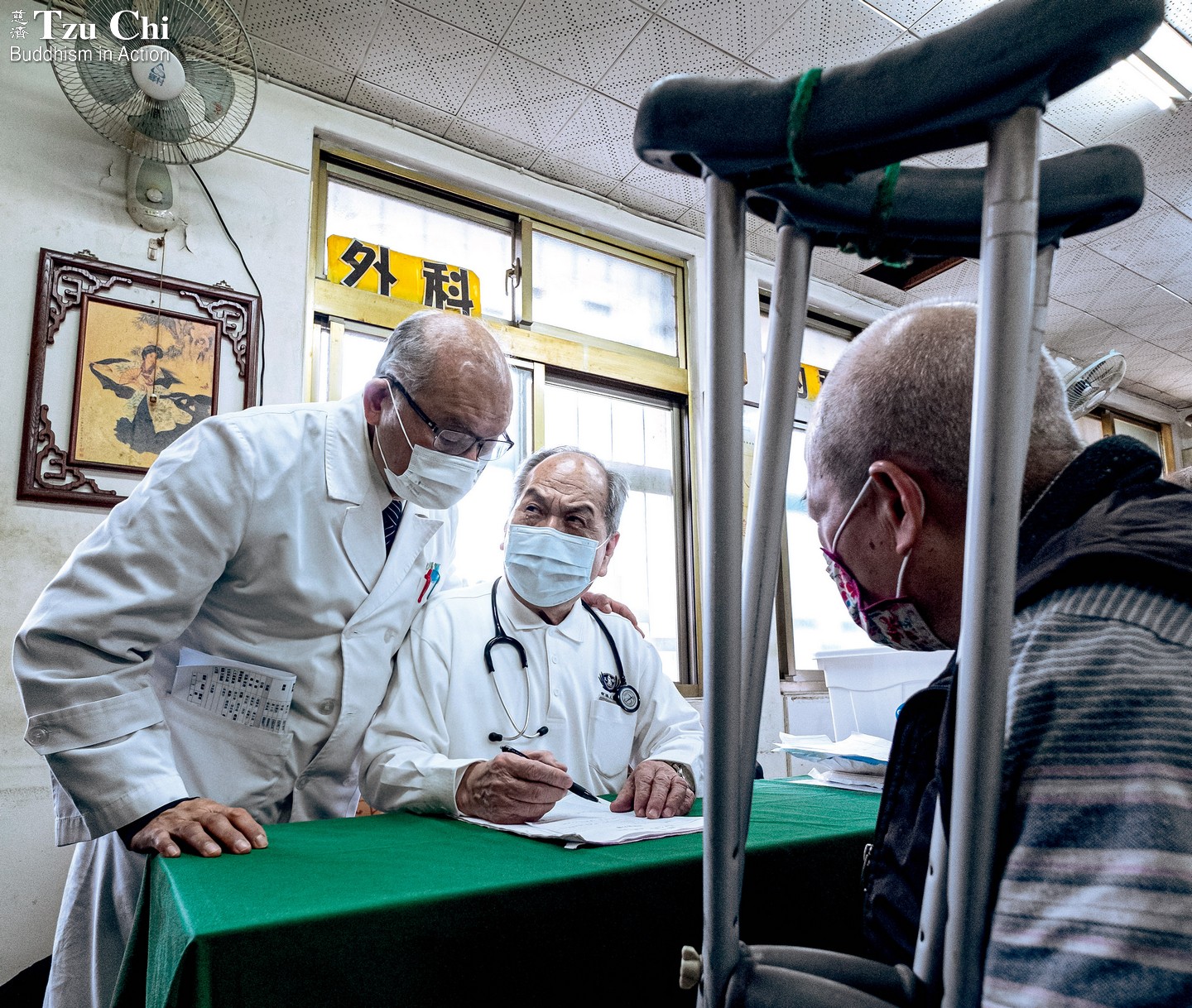
TIMA doctors Ji Bang-jie (left) and Liu Zeng-an (劉增安, middle) see a street person at a monthly free clinic held at the Zenan Foundation’s Taichung station in Taichung City, central Taiwan.
Everyone has their story
There are nearly 3,000 listed homeless people in Taiwan. According to statistics from the Taichung City government’s Social Affairs Bureau, about 300 of them are registered with the Taichung City government. About 180 of these are from outside Taichung. Huang Tian-shi (黃天時) is a social worker who has served at TCAH for more than a decade. He said that after the 9/21 earthquake devastated central Taiwan in 1999, Taichung City offered many work relief opportunities, which enticed people from nearby cities and counties to flood into Taichung to find jobs. Some became homeless after failing to find steady employment. Two more peaks in the number of street people in Taichung occurred after the SARS epidemic of 2003 and during the COVID-19 pandemic. Taichung Park, the Taichung Station underpass, and Chunghsing Hall have all become haunts for homeless people in the city.
There is a sad story behind every curled-up figure out in the streets in the depth of the night. “Most of them have ended up on the streets due to economic problems,” Huang Tian-shi explained. “A small minority have left home because of issues with their families. There are also some who are incapacitated by injuries and can no longer work.” Huang, a veteran social worker for the homeless, said that every street person has their own reason for ending up on the streets; it is impossible to enumerate all of them. Because they don’t have homes and often suffer from inadequate sleep, many of them have health issues. Some worry about their work or lack a sense of security, leading to signs of mild depression. Quite a few are trapped in a vicious cycle of poverty and illness as they struggle to get by.
“Some people in our society think negatively of the homeless,” Huang continued. “They ask, ‘How could an able-bodied person not be able to find a job?’ Our association provides food and shelter for the homeless, but we also encourage them to try to get back on their feet as soon as possible. If they get used to their homeless life, it is harder for them to return to society.”
According to the regulations of the Social Affairs Bureau, homeless shelters are allowed to put street people up for a maximum of three months, during which time social workers encourage them to go look for work. If a street person succeeds in landing a job and the hours they keep correspond to regulations, their residence at a shelter can be extended. Once they start earning a steady income, they can rent a place of their own. It takes resolve, as well as some help, to finally say goodbye to a homeless life.
Bao, 52, had a traffic accident in 2020, during which he sustained a severe injury to his head. He looked normal after surgery, but the aftereffects of the accident—dizzy spells—rendered him incapable of returning to his former position as a security firm employee. Depression followed. His parents had long since passed away and he had lost touch with his siblings. After he used up his savings and could no longer afford a rental, he lived on the streets for a while before seeking help at TCAH. The association put him up and put him to work helping them manage their homeless shelter, giving out meals, and taking care of other miscellaneous chores. With a focus back in his life, he stopped dwelling on negative thoughts and became more cheerful. “I hope to go back to gainful employment in the future so that I can lead a normal life again,” he said.
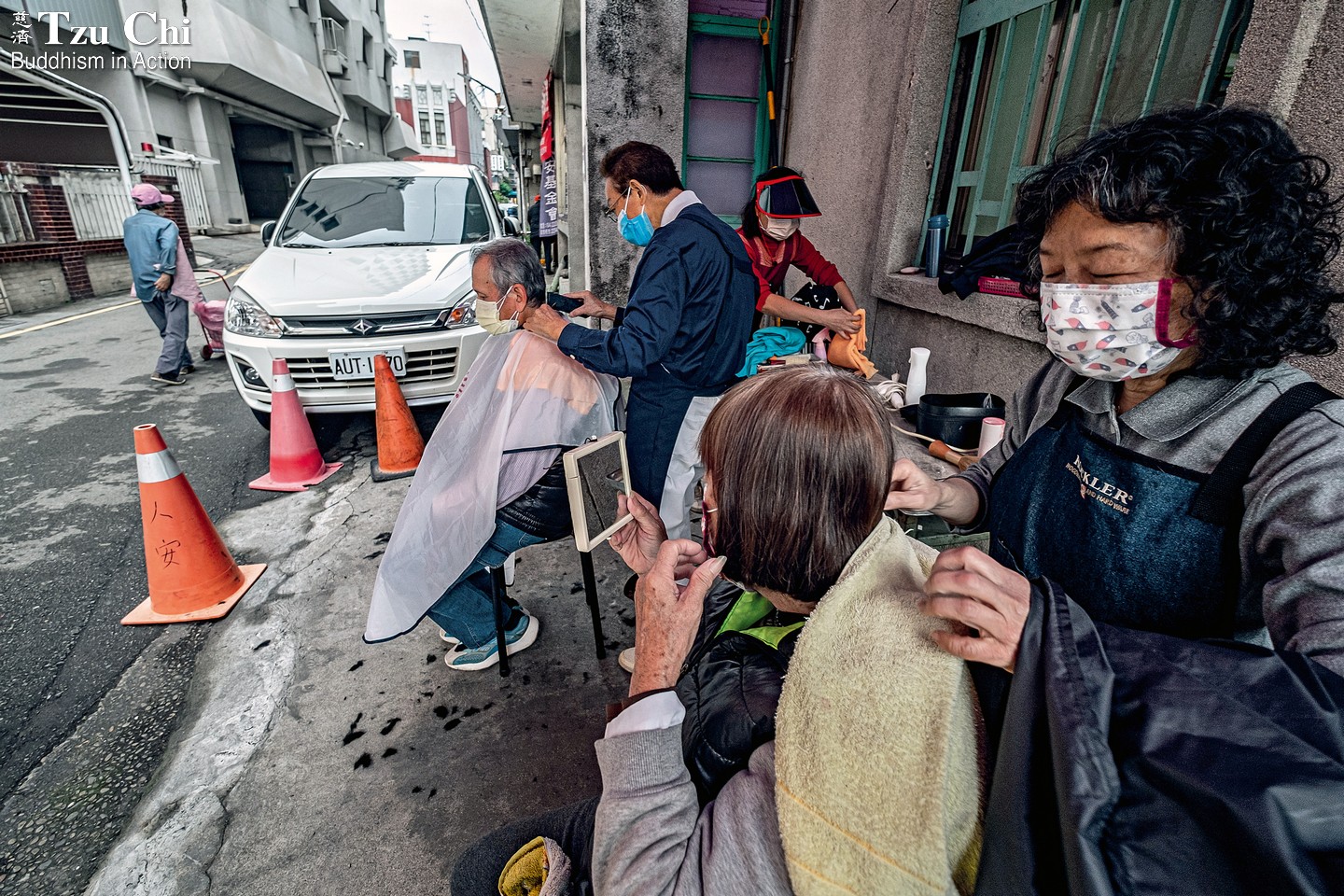
Tzu Chi volunteers provide free haircuts concurrent with a free clinic for street people at the Zenan Foundation’s Taichung station.
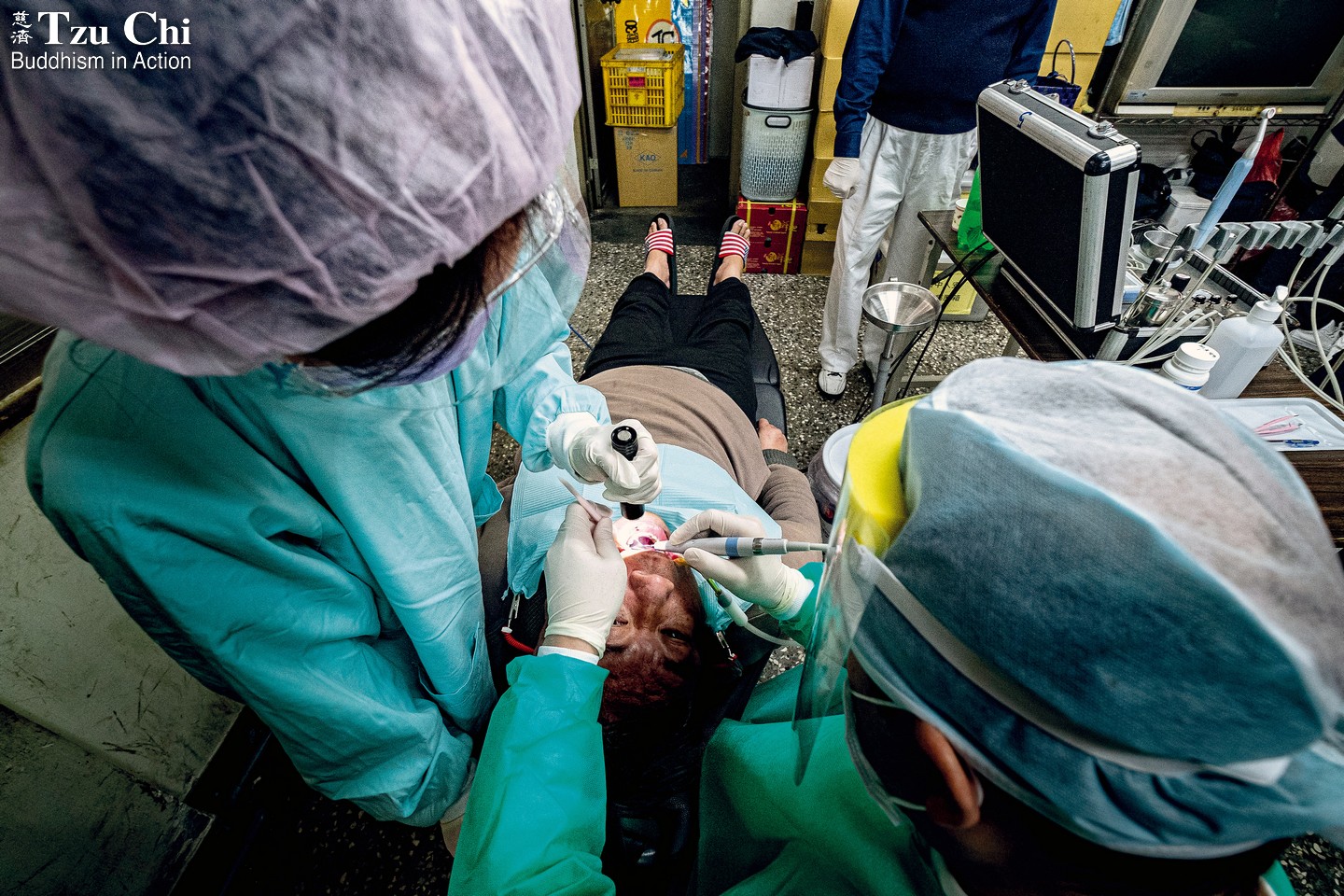
Tooth loss is common among street people. Besides providing treatment for the homeless at the monthly free clinic, TIMA dentists share oral health tips with them.
The greatest fear—illness
Because the homeless don’t have fixed addresses, most employers won’t hire them for long-term work. Most of the jobs they can get are temporary, unskilled manual work, such as holding advertising signs. They can make more than a thousand New Taiwan dollars (US$34) a day doing odd jobs like that.
According to TCAH, over half of the street people in Taichung have some form of work. Social welfare organizations in the city help them get paying jobs by submitting bids for work such as sweeping the streets or working on a farm and then sub-contracting the work out to them. Social workers with such organizations encourage street people to seize every opportunity to work so that they can reintegrate to society sooner and live with more dignity.
Taichung has six social welfare organizations dedicated to the care of street people and other disadvantaged groups. Examples include TCAH, which provides shelter for males, the Good Samaritan Women Center, which mainly focuses on serving females, and the Zenan Foundation, which has branches all over Taiwan. All three organizations offer food, access to washing facilities, short-term shelter, and job-placement services.
Street people usually have no problems staying fed with the help of such organizations, but becoming ill presents a bigger challenge. In the past, a person’s national health insurance card (NHI card) would be cancelled due to failure to meet premium payments. When that happened, street people often avoided going to the doctor, thus increasing the likelihood of allowing a minor ailment to develop into a major one. Back then, Tzu Chi volunteer Wu Ping-chang (吳平常), who started helping street people more than 20 years ago, would take homeless people who couldn’t afford a visit to the doctor to Dr. Ji Bang-jie for help. That’s why TCAH approached Dr. Ji when they thought of providing regular free clinics for the homeless. Since then, Dr. Ji and other TIMA members have seen homeless patients at the Zenan Foundation’s Taichung station every month for 12 years, helping many street people.
In June 2016, in order to better protect the public’s healthcare rights, Taiwan’s government stopped canceling the NHI cards of those people unable to make their premium payments. People having difficulty paying their premiums can apply for help from a government relief fund or choose to be referred to public service organizations, corporations, or individuals for assistance. They can also opt to pay off their premiums by installment.
The new measure provided the disadvantaged a way out of their healthcare predicament. Now they can see a doctor as long as they are NHI card holders. That said, when they seek medical attention at a clinic or hospital, they still need to pay registration fees and a co-payment. (The co-payment is an amount that individuals seeking medical treatment must pay themselves, intended to prevent inappropriate use of medical resources.) Though these required payments are not much money for most people, it’s beyond the means of some street people. Thus, Tzu Chi free clinics for the homeless still play a role in keeping them healthy. By early 2022, TIMA members had served more than 5,000 patient visits at the Zenan Foundation’s Taichung station. The free healthcare services are especially a benefit for those with chronic conditions. Regular follow-ups and long-term medication often lead to significant improvements in their conditions.
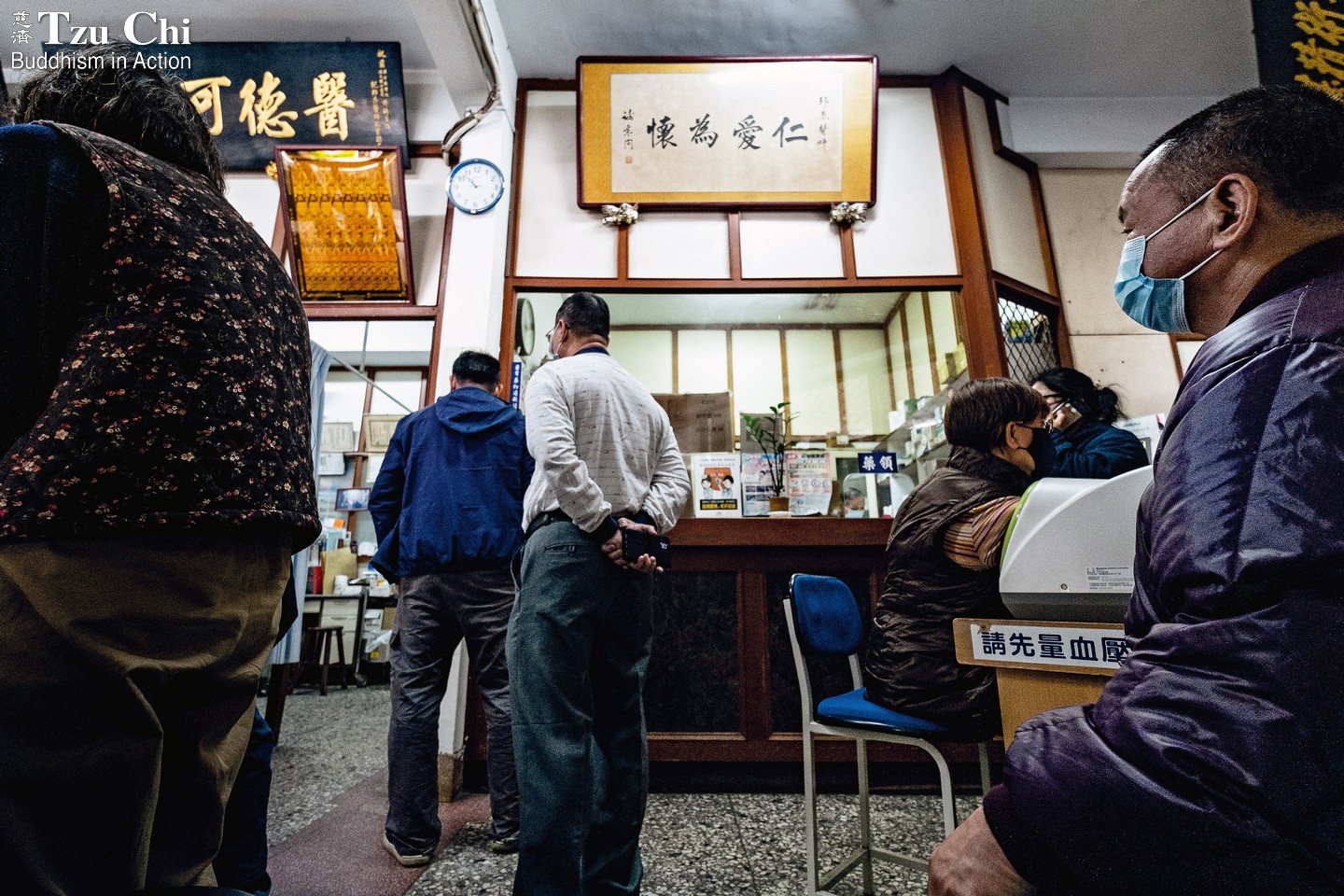
Dr. Ji Bang-jie’s clinic has for many years offered free medical care to the homeless. Street people who need medical attention outside the days of the monthly free clinic at the Zenan Foundation’s Taichung station can seek help there.
Dr. Ji’s clinic
The free clinic is a monthly affair. When street people have medical needs on regular days, Dr. Ji’s clinic opens its arms to them. “All lives are equal. By tending to their medical needs, we give them some warmth and hope, which might help them find the strength to stand back up,” said the doctor. His loving care has touched and warmed many street people. Many have continued to go to him for healthcare even after they’ve found a job and no longer live on the streets.
Dr. Ji’s clinic offers treatment in surgery, urology, family medicine, and other fields, but when street people are diagnosed with major illnesses, they still need to be referred to a hospital for treatment. “When Taichung Tzu Chi Hospital opened,” said Dr. Ji, “it became my first choice when referring street people. It’s easier for us to continue to keep an eye on them there. Should they need help paying their medical bills, social workers at the hospital will assess their needs and then refer them to the Tzu Chi Foundation or connect them with other social resources.”
Lian is a street person afflicted with hereditary diabetes. Repeated business failures landed him deep in debt. Even his family turned their backs on him. Because of his unstable health condition, people with the Zenan Foundation suggested he seek help at Ji’s clinic. “Dr. Ji is a very warm-hearted person,” said Lian. “He shows a lot of care for us homeless people, whether it’s about our health or living conditions. He never charges us when we go to his clinic for treatment, and he even gives us monetary gifts or goods on major holidays. He’s the best doctor I’ve ever seen.”
Ji continued to see street people at his clinic during spikes in COVID-19 cases in Taiwan. He feels that as long as due precautions are taken, one shouldn’t worry too much about the infection. “I am a doctor,” he said. “How could I evade my responsibilities when I am needed the most? Some homeless people suffer from skin conditions and have lesions that need cleaning and dressing every day. If I stop seeing them, what would they do?”
Homeless people are an issue the world over. Some just need a hand to help them through a rough patch in life. In Taiwan, individuals and organizations have worked together to help this group of marginalized people. Everyone can get down on their luck—a strong safety net is how we can ensure that as few people as possible are left in the lurch when they are hapless.
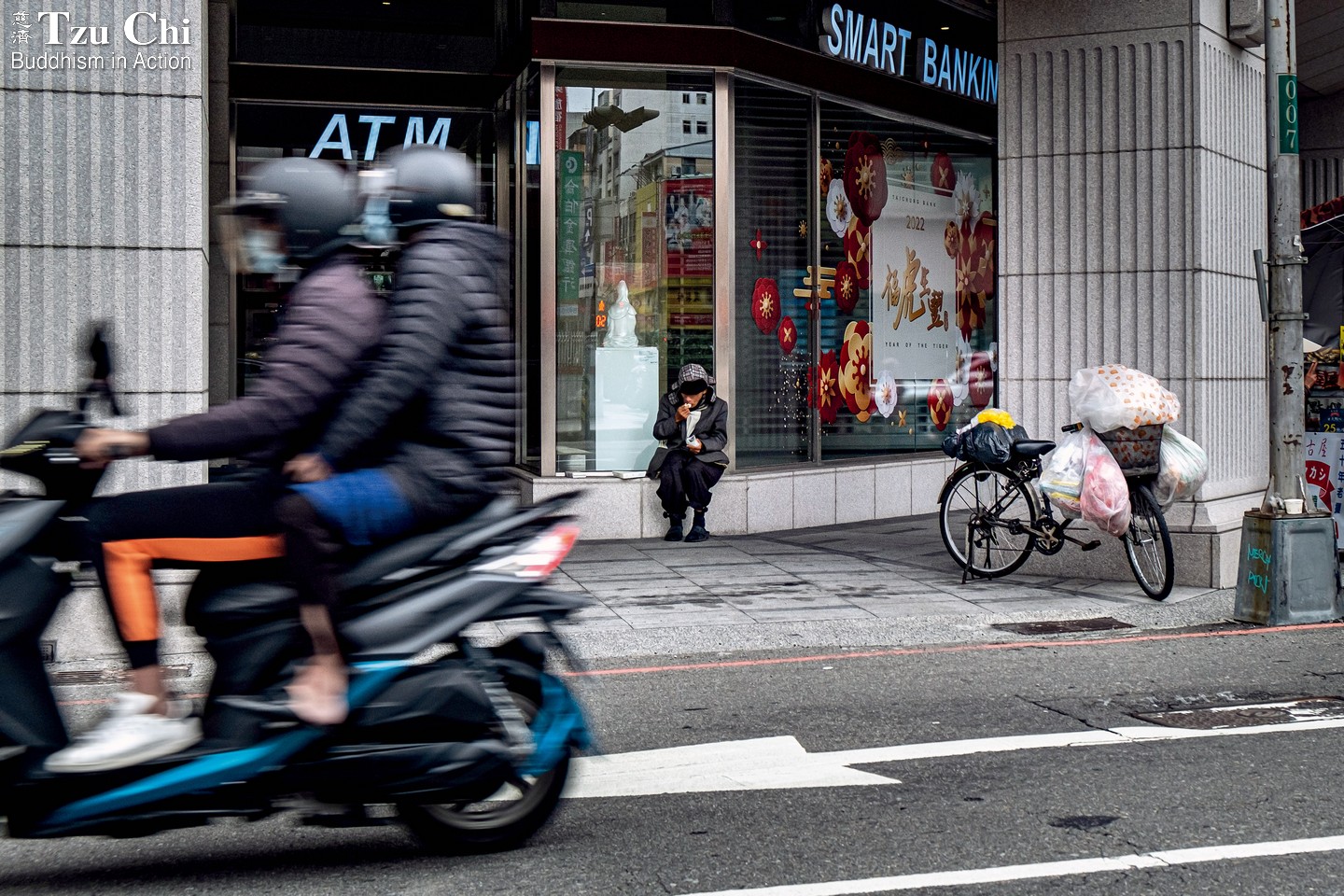
Not all street people are homeless. A variety of reasons have led them to live on the streets. Many work and make do with their small incomes.


